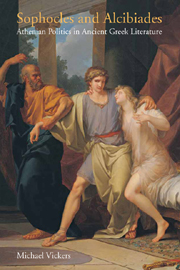Book contents
- Frontmatter
- Contents
- Preface
- 1 The mythologizing of history
- 2 Antigone, Pericles and Alcibiades
- 3 Oedipus Tyrannus, Alcibiades, Cleon and Aspasia
- 4 Ajax, Alcibiades and Andocides
- 5 Philoctetes, Alcibiades, Andocides and Pericles
- 6 Alcibiades in exile: Euripides' Cyclops
- 7 Oedipus at Colonus, Alcibiades and Critias
- 8 Critias and Alcibiades: Euripides' Bacchae
- 9 Alcibiades and Melos: Thucydides 5.84–116
- 10 Thucydides on tyrannicides: not a “digression”
- 11 Alcibiades and Persia (and more Thucydidean “digressions”)
- 12 Alcibiades and Critias in the Gorgias: Plato's “fine satire”
- Epilogue
- Bibliography
- Index locorum
- Index
5 - Philoctetes, Alcibiades, Andocides and Pericles
- Frontmatter
- Contents
- Preface
- 1 The mythologizing of history
- 2 Antigone, Pericles and Alcibiades
- 3 Oedipus Tyrannus, Alcibiades, Cleon and Aspasia
- 4 Ajax, Alcibiades and Andocides
- 5 Philoctetes, Alcibiades, Andocides and Pericles
- 6 Alcibiades in exile: Euripides' Cyclops
- 7 Oedipus at Colonus, Alcibiades and Critias
- 8 Critias and Alcibiades: Euripides' Bacchae
- 9 Alcibiades and Melos: Thucydides 5.84–116
- 10 Thucydides on tyrannicides: not a “digression”
- 11 Alcibiades and Persia (and more Thucydidean “digressions”)
- 12 Alcibiades and Critias in the Gorgias: Plato's “fine satire”
- Epilogue
- Bibliography
- Index locorum
- Index
Summary
Sophocles' Philoctetes dwells on the plight of the homonymous Greek hero who has been abandoned on the island of Lemnos by his countrymen on account of a repugnant wound in his foot. Years later, Odysseus, accompanied by Neoptolemus, the son of Achilles, returns to Lemnos to acquire the bow that Philoctetes had been granted by Heracles, without which the Greeks would never take Troy. In his The Cure at Troy (1990) Seamus Heaney reshaped Sophocles' play in order to make it fit the contemporary political picture (he identifies Philoctetes with Unionism, Neoptolemus with the Southern Irish, and Odysseus with the Provisional IRA). In similar fashion, I believe that the poets of antiquity would reshape old tales in order to fit a contemporary situation (which would go a long way to explain the discrepancies with which ancient mythology is replete). Heaney's veiled political analogue is thus in principle identical with Sophocles' treatment of events of his own day, in which reconciliation was again much to the fore, in this case centred on the terms on which Alcibiades might be allowed to return from exile.
But to make such a connection between Heaney and Sophocles is tantamount to heresy to those who believe in Dodds' “essential critical principle” that “what is not mentioned in the play does not exist”, and who share Wilamowitz's position that politics never intrude on Sophoclean drama.
- Type
- Chapter
- Information
- Sophocles and AlcibiadesAthenian Politics in Ancient Greek Literature, pp. 59 - 81Publisher: Acumen PublishingPrint publication year: 2008



